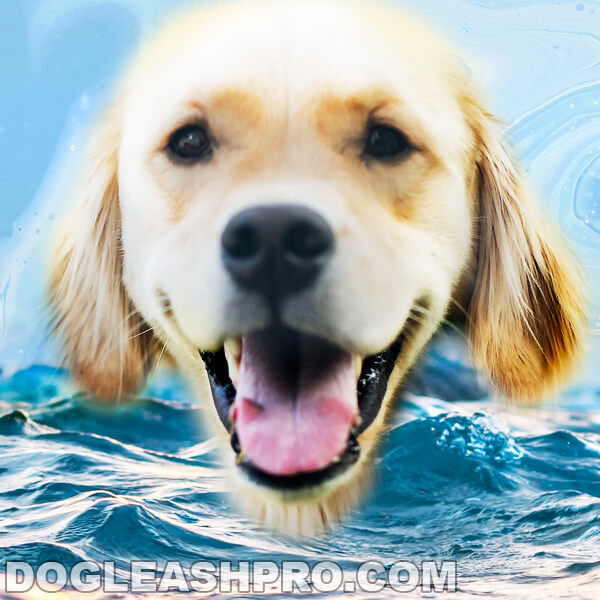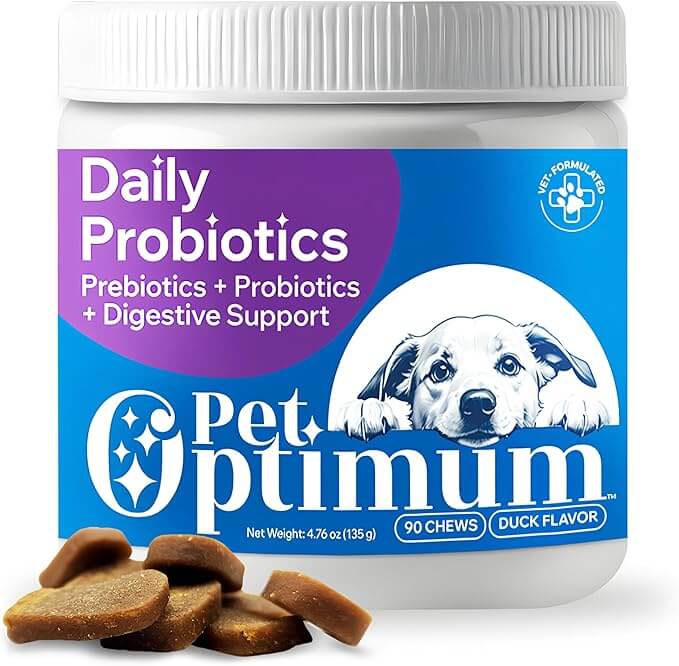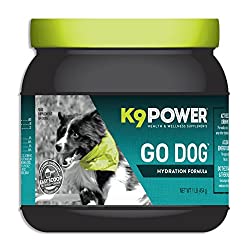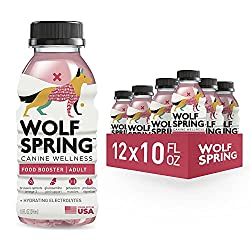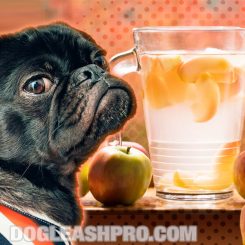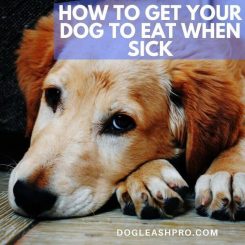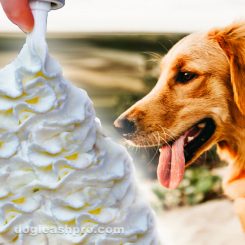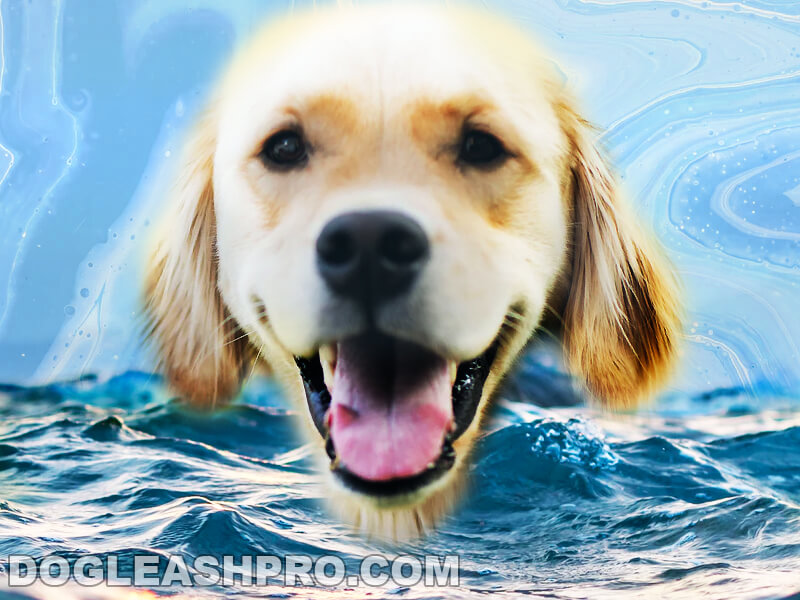
What can dogs drink besides water? Ideally, water should be the only drink you give your dog. While there are other drinks your dog can sip occasionally, water is the only fluid that is 100% safe for all dogs.
Like most dogs, my Labrador pup will drink any liquid she sees, whether it is safe for her or not. But when she is sick, she’ll refuse to drink or eat. Pet owners will need to find creative ways to keep their dogs hydrated especially when they are sick. First, you’ll want to know how long can a dog go without water and then find out what can you give your dog to drink besides water.
Table of Contents
Should dogs only drink water?
For the most part, yes, dogs should only drink water. Water is the safest drink for your fur buddy, and it is safe for all dogs to consume without any issues. Hydration is important for dogs of all ages, so make sure you always have plenty of water available for them.
Why is water important for dogs?
Water is essential and is an integral element for all living things. For dogs, water is necessary for the proper functioning of organs and muscles, and it helps regulate their body temperature.
Healthy dogs need about an ounce of water for every pound of body weight each day.
For instance, say your pooch weighs 30 pounds. They would need about 4 cups of water each day to keep them hydrated and well-balanced.
If your pup has an active lifestyle or lives in a hot environment, their hydration needs will be slightly more.
DON’T MISS: Are Ceramic Bowls Safe For Dogs?
Can dogs drink anything other than water?
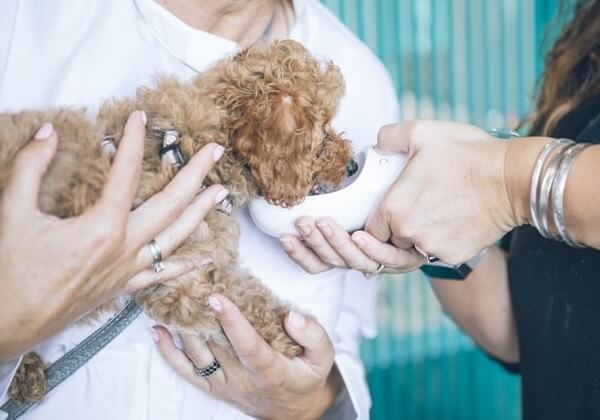
Yes, but you shouldn’t consider any other drink a water replacement. Nevertheless, there are some other fluids in small quantities that are safe for your furry friend. Now, you may think, “what about milk? After all, it’s what all mammals grow up on.”
But unfortunately, dogs develop an intolerance for milk right after puppyhood so they become lactose-intolerant, and giving adult dogs any dairy product can cause them digestive distress.
Consider the foods that are safe for dogs and if any of them can be juiced. Fruits and veggies like carrot, beetroot, spinach, watermelon, and apple are canine-friendly, and so are their juices.
Chicken and beef are regular parts of the doggy diet, and their broth is also safe for dogs to drink. Lastly, coconut water and nut milk are also safe for canine consumption. Below, we explore some more options.
What else can dogs drink besides water?
The answer to “what else can a dog drink besides water?” is probably, “not much.” The best drink for dogs is plain, fresh, and clean water.
Nevertheless, you can find drinks tailor-made for dogs. These doggie-oriented drinks include beers, energy drinks, teas, and tonics that contain only canine-friendly ingredients. However, your dog can get those benefits from far better sources, making their value for money questionable.
But if you’re still wondering, “What else can my dog drink besides water?” read ahead.
What can dogs drink other than water?
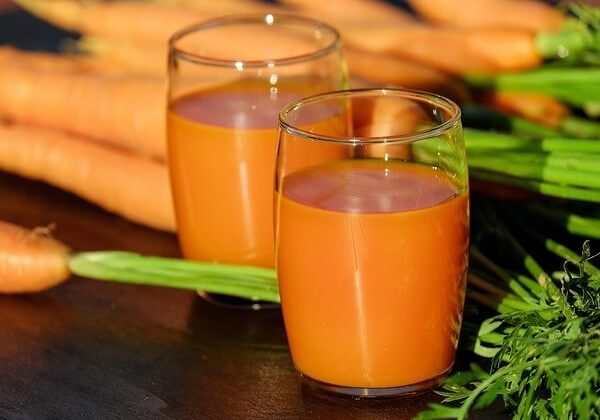
Canine owners often wonder, “What drinks can dogs have?” and “Can dogs drink anything else besides water?” If you’ve ever had these questions, the list we’ve made should curb your curiosity.
1. Vegetable juice or extracts
Vegetables like carrot, beetroot, kale, celery, and spinach are healthy canine snacks packed with vitamins, minerals, and tons of other nutrients. They’re also low in calories and have no known side effects for dogs; therefore, it makes sense for their juices to be safe and beneficial for dogs.
You can juice beets, celery, and carrots in a food processor. For spinach and kale, you can boil and sieve them to get their extracts.
2. Coconut water
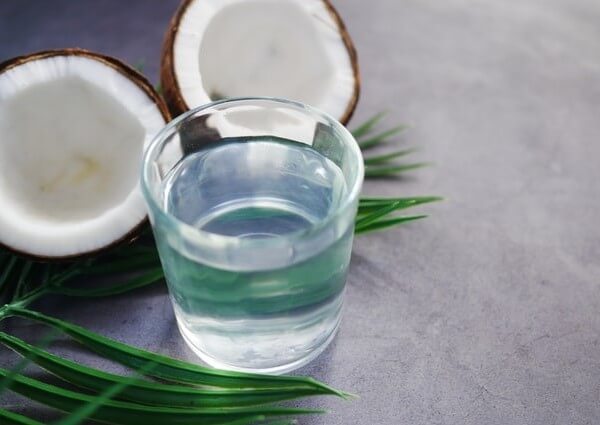
Coconut water ranks highly among water alternatives for dogs. Aside from its hydrating properties, coconut water is packed full of essential minerals, vitamins, and electrolytes. The nutrients in coconut water can also cure skin issues, improve fur quality, and get rid of bad breath in dogs.
3. Nut milk
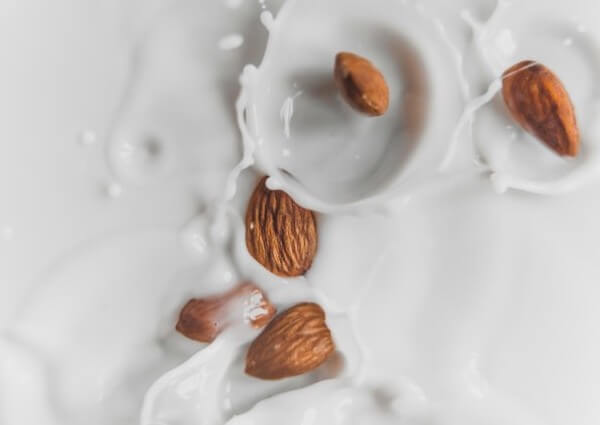
While dairy milk isn’t the best drink for dogs due to its lactose content, nut milk makes a healthy substitute.
Milk made from almond, soy, and coconut contains plenty of nutrients without any lactose. Moderate amounts of nut milk can improve immunity, prevent bad breath, and help dogs meet their daily caloric intake.
However, make sure your dog isn’t allergic to nuts and the milk doesn’t contain any artificial ingredients. Almond and soy milk is also high in calories, so don’t go overboard with them.
You may be interested in: Can Dogs Drink Ensure? Ensure is a nutritious supplement for those who have difficulty eating or digesting food on their own. Find out if it is safe for doggy consumption.
4. Beef or chicken broth
If you often wonder what drinks are safe for dogs, look no further than the juice of their food such as beef and chicken broth. Broth contains all the goodness of chicken and beef in the form of an easily digestible extract.
You can feed your canine friends plain beef and chicken broth, or you can add it to their food and water for added flavor. Broth also helps soothe the stomach of a doggie suffering from gastrointestinal distress.
Handy Hint: When dogs are sick or not feeling well, they may lose their appetite. Check out How to Get Your Dog to Eat When Sick to find tips and tricks on how to get your dogs to eat again so they can be on their way to better health.
5. Fruit juices
You can let your dog drink fruit juices, but you have to consider what dogs can drink safely. Fresh juices made from dog-friendly fruits are the only fruit nectar you should give your K9 pals.
Many store-bought juices contain artificial flavors, sweeteners, and preservatives that do your dog no favors. Also, you have to ensure the juice isn’t from grapes, sour fruits, berries, or any other fruits that are toxic to dogs.
Fun Fact: Sugary carbonated drinks like Sprite also contain artificial flavors. Check out Can My Dogs Drink Sprite? to find out if Sprite is safe for doggy consumption.
6. Kefir
On the topic of what liquids can dogs drink, we can’t ignore the probiotic powerhouse: kefir. Kefir is a fermented drink made from cow, goat, or coconut milk.
Probiotics are good bacteria, and their abundance in the dog’s belly ensures pristine gut health and no gastrointestinal disturbances. Dogs suffering from digestive distress due to antibiotics can benefit a lot from the probiotic goodness of kefir.
While kefir is a great natural source of probiotics, not all dogs may take to it, and consistency in probiotic intake is essential for lasting gut health benefits.
For a more convenient and reliable option, PetOptimum Probiotics for Dogs provides a daily dose of beneficial bacteria in a delicious, easy-to-administer chew, ensuring your dog gets the digestive support they need.
Check out: Can Dogs Drink Yakult? to find out if dogs can have this probiotic drink.
What can puppies drink besides water?
The best drink for puppies besides water is milk. Puppies don’t develop lactose intolerance until they are older, and it is safe to give them milk in moderate quantities. To be on the safe side, go for dog milk or low-lactose goat milk.
In case dog milk is unavailable, you can also go for specially-curated baby dog formula milk. Puppies can also drink fresh juices extracted from dog-friendly fruits and veggies. Beef and chicken bone broth is another excellent pup drink. Nonetheless, your pup’s safety should be your priority, and you should always consult a vet before experimenting with any new diet.
You may be interested in Puppy Has Diarrhea But Still Playful
What can I give my dog if he is dehydrated?
The best thing to give your dehydrated dog is water. But if your furry family member isn’t drinking water for some reason, there are ways to make water taste better for them.
Add one or two ice cubes to make the water cooler and more appealing. You can also add some electrolyte solution if the dehydration is severe. If you don’t have an electrolyte solution at hand, make your own by adding a little sugar and salt to plain water.
Broth also makes a fine water additive. Adding a tablespoon or two to your dog’s water bowl would not only improve its taste but also comfort your pup’s upset stomach.
If your K9 pal’s dehydration is severe, you’d need to take him to a vet. In such cases, your pup can’t drink water on his own and would need fluids to be administered intravenously. At home, you can also hydrate your furry pal by using a needleless syringe to squirt water inside his mouth.
What drinks besides water should my dog never drink?
Now that you know what drinks besides water your dog can have, you should also learn about what drinks your precious pup should not have. While some are unsafe in large quantities, others are downright toxic, even in small amounts. Let’s go over them.
1. Cow milk
While cow milk is safe and healthy for most of us, it’s not beneficial for dogs. Most dogs are lactose intolerant, and consuming dairy can give them stomach pain, gas, and even diarrhea. Note that lactose intolerance varies from dog to dog—some dogs may be more tolerant to milk than others. But it’s best to err on the side of caution and avoid milk altogether.
Handy Hint: Diarrhea is a common symptom in dogs if they consume something that doesn’t sit well with their stomach. Sometimes, dogs may act fine even though they had diarrhea. Check out My Dog Has Diarrhea But Is Acting Fine to learn more!
2. Alcohol
Keep beer, wine, and any other alcoholic beverage far away from your furry friend. The canine liver isn’t designed to process alcohol, and the dog’s digestive and nervous system can go haywire after ingesting it.
Dogs are also much smaller than us, meaning it does not take much alcohol to mess a dog up.
It’s important to keep wine (both red and white wines) out of your dog’s reach because they are made of fermented grape juice. Grapes in general are toxic to dogs.
So in addition to the fact that wine has alcohol in it, it also contains an ingredient that is poisonous to dogs.
3. Anything with added sugar
Dogs get all the sugars they need from their regular diet, and they don’t need any excess sugar. Most juices available in the market—even the ones labeled “natural”—contain added sugars. If you want to give juice to your dog, only go for the freshly squeezed variety and not the packed stuff. Homemade juices are also a great option.
4. Anything with caffeine
Tea, coffee, energy drinks, and milkshakes containing coffee or chocolate flavoring are toxic for dogs. Considering dogs’ small size, any amount of caffeine can induce caffeine poisoning. Side effects of drinking caffeinated drinks include diarrhea, seizures, vomiting, restlessness, and excessive urination that can lead to dehydration.
Fun Fact: Peppermint tea is caffeine-free so is it safe for dogs? Check out Can Dogs Have Peppermint Tea? to find out!
5. Soda
Carbonated drinks like soda pop contain a high amount of sugar, caffeine, and a slew of artificial ingredients. They give your furry friends no nutritional benefits and only contribute to unhealthy weight gain and stomach troubles. Soda can also lead to a painful condition called bloating and other gastric issues in dogs.
6. Citrus drinks
While oranges aren’t extremely dangerous to dogs, sour and citrus fruit juices like lemonade can give the dog an upset stomach, nausea, and hypersensitivity to light. The culprit in these fruits is citric acid, which isn’t safe for dogs.
7. Sports drinks
Another flavored water option that isn’t safe for doggy consumption is sports drinks. Although sports drinks contain electrolytes, they are packed full of salt, sugar, and plenty of other ingredients that are harmful to our dog’s health.
What are some canine-friendly and healthy drinks for dogs?
Whenever my two dogs refuse to drink water for any reason, I give them the following safe, healthy, and energy-boosting doggy drinks. They love the flavor and will down this stuff even when they aren’t thirsty.
Can dogs drink flavored water?
Yes, dogs can drink flavored water if the flavored water products are specifically formulated for your canine friends. If you get flavored water products for your pooch from your local grocery stores or supermarket, make sure they are made specifically for dogs.
The good news is that you can make flavored water for your dogs at home. This way, you know what is in the flavored water you’re about to feed your furry friends. Not only is homemade flavored water budget-friendly but you know that there are no ingredients in it that would harm your four-legged friends.
Some flavored water options that are safe for doggy consumption include the following:
Broth-flavored water
There are tons of broth-flavored water options which include chicken broth, bone broth, tuna broth, and beef broth. Not only is broth-flavored water tasty and delicious, but it is packed full of nutrients that are good for your dog’s health.
If you plan on feeding your dog broth-flavored water, avoid adding in any ingredients that are toxic to dogs such as garlic, onion, pepper, or pepper.
Fruit-infused water
If your dog loves watermelon, cucumber, or apples, try adding some of that juice to his drinking water. Fruit-infused water smells great and this can stimulate his senses and motivate him to drink.
When it comes to fruit-infused water, stay away from grapes and avoid grape juice as this fruit is toxic and dangerous to dogs.
Lemon-flavored water
This is another great option because lemon-flavored water has a tangy and tart flavor which some dogs will love. Lemon-flavored water is packed full of vitamin C which will support a healthy immune system in dogs and give them a hydration boost.
Be sure not to go overboard and only add 3 or 4 drops of lemon juice to your dog’s water. Lemon, as we know, is quite acidic so naturally, some dogs will not like it. If your pooch doesn’t like it, don’t force him to drink it.
Apple cider vinegar-flavored water
Sometimes our canine friends may not want to drink water because they’re not feeling well or have digestion issues that cause them to turn away from both food and water.
If this is the case with your four-legged friends, try adding 1 to 2 drops of apple cider vinegar into his drinking water. Not only does apple cider vinegar help to promote proper digestion, but it can also help to support joint health, combat yeast infection, and provide allergy relief. This drink is also great for his dental health as well.
So, what can dogs drink besides water?
Dogs can drink some fresh juices, coconut water, carrot extract, nut milk, bone broth, and kefir in moderate quantities. Make sure you don’t give them anything containing added sugars, salt, or preservatives. When it comes to hydrating your dog in the safest way possible, stick to clean fresh cool water.
DISCLAIMER: THIS WEBSITE DOES NOT PROVIDE MEDICAL ADVICE
The information, including but not limited to, text, graphics, images and other material contained on this website are for informational purposes only. No material on this site is intended to be a substitute for professional veterinary advice, diagnosis, or treatment. Always seek the advice of your veterinarian or other qualified health care provider with any questions you may have regarding dietary needs.
Resources:
https://www.ncbi.nlm.nih.gov/pmc/articles/PMC6305449/
https://wms.org/magazine/1112/Vet-Medicine-Canine-Hydration

With over five years of specialized experience as an animal writer, my expertise lies in dog nutrition, health, behavior, grooming, and training. I am dedicated to delivering helpful and informative content that caters to the well-being of our furry friends. My primary goal is to empower pet owners with knowledge and ensure our canine companions thrive in health and happiness. In my free time, I love volunteering at local dog rescue centers.
